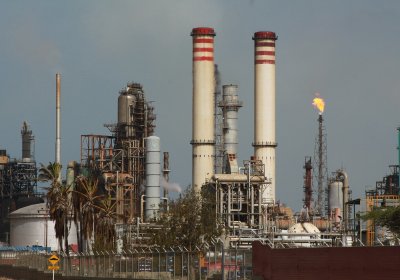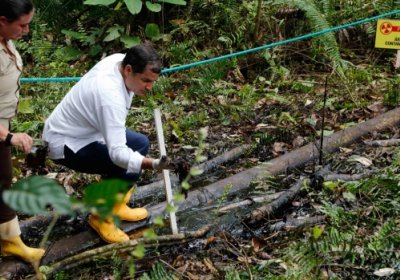Chevron rakes in billions of dollars a year from exploiting Israeli-claimed fossil gas fields in the eastern Mediterranean Sea, which generate hundreds of millions of dollars of tax revenue for Israel. Zara Lomas reports.
Chevron
On the day that climate scientists said the world is heading for 2.5°C global warming, Labor announced it would accelerate major new fossil fuel projects beyond 2050. Colin Hughes reports.
Andreína Chávez Alava reports that United States President Joe Biden's administration has authorised Chevron to negotiate its licence and “the terms of potential future activities in Venezuela” with Venezuelan state oil company, PDVSA.
It is bad enough that Australia is not on track to cut its greenhouse gas emissions by 26–28% on 2005 levels by 2030, as it is notionally committed to doing, but according to the government's own figures, it is only set to reduce them by 5%. What makes it worse is that even the 26–28% target is very conservative and unlikely to be sufficient.
In truth, wealthy industrialised countries like ours should be seeking to become net zero emission economies and societies, both because we can and because it is simply not worth gambling with the continued existence of life as we know it.
Chevron has become the second big oil company to abandon plans to drill for oil in the Great Australian Bight off the South Australian coast, a year after BP cancelled its plans to drill.
Oil companies say the Bight has similar potential to the Gulf of Mexico, site of the Deepwater Horizon oil spill of 2010, which was the largest marine oil spill in history and killed 11 people.
BP’s recent decision to pull out of a plan to drill for oil in the Great Australian Bight has been dubbed “strategic” by the company’s exploration managing director, Claire Fitzpatrick.
US multinational energy corporation Chevron faces an increased tax bill of $340 million after losing an appeal against the Australian Taxation Office (ATO), over a landmark profit-shifting case.
The full Federal Court on April 21 unanimously upheld a previous decision that Chevron engaged in illegitimate transfer pricing by paying a higher rate of interest on a loan from its subsidiary to shift profits from Australia to the US.
Ecuadorean indigenous groups’ years-long court battle to force oil giant Chevron to pay US$9.5 billion in damages for the environmental disaster known as the “Amazon Chernobyl” began a new phase on September 12 — this time in Canada.
Plaintiffs from Ecuador have been trying for years to collect damages it won in its 2011 lawsuit against Chevron in a court in Ecuador, where the multinational oil giant no longer has assets that can be seized.
A United States federal appeals court ruled on August 8 in favour of the oil giant Chevron in a case that dates back more than 20 years. The ruling blocks an Ecuadorean indigenous community from collecting a judgement of nearly US$8.6 billion for environmental damage to the Amazon rainforest.
About 100 people rallied at Glenelg in Adelaide to protest against plans by oil company British Petroleum to explore for oil in the Great Australian Bight.
- Page 1
- Next page











